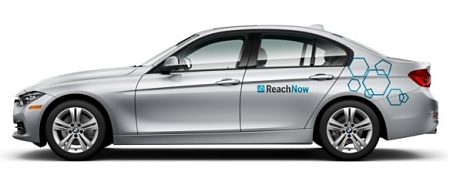German luxury automaker BMW may be entering the ride-hail market space currently dominated by Uber and Lyft.

BMW board member Peter Schwarzenbauer told the German news website Spiegel Online that he could envision BMW expanding its current DriveNow car-sharing service with Sixt to compete on a global stage.
BMW is not the only major car company eyeing the ride-hail market. General Motors recently paid $500 million for a stake in Lyft and Daimler, the parent company of Mercedes Benz, acquired tax-hailing app MyTaxi as well as a stake in limo service Blacklane.
BMW’s opportunity may be strongest in Europe, where ride-sharing is well-established. Uber has faced strong opposition in many markets with its aggressive tactics. In Germany, Uber has also been forced to dramatically scale back its expansion due to various court bans and opposition from taxi operators.
BMW’s existing car sharing fleet operates in cities in Germany, Austria, the U.K., Denmark and Sweden.
DriveNow has added more than 470,000 customers around the world over the last four years, including 430,000 in Germany. Since 2013, DriveNow has been running 60 all-electric BMW ActiveE cars in Munich and Berlin as part of the WiMobil and ePlan research projects. They have performed well in day-to-day use and have been replaced by 40 BMW i3 cars in Berlin, 30 in Hamburg and 30 in Munich.
BMW clearly has an eye on autonomous vehicles, much like GM. BMW has made a strong commitment to technology and its project i 2.0 reflects a focus on high definition digital maps, sensor technology, cloud technology and artificial intelligence, the decisive areas for success in autonomous vehicles.
“Our focus is clear: we are securing the BMW Group’s position as technological market leader,” said Klaus Fröhlich, member of the Board of Management responsible for development. “With project i 2.0 we will lead the field of autonomous driving. We will turn research projects into new kinds of industrial processes, bringing future technology onto the road.”
BMW’s 7 is equipped with a stereo camera and five radar sensors. BMW's flagship model stays in lane and maintains a safe distance to the vehicle ahead, even when driving up to 210 km/h on motorways. The BMW 7 Series is even able to drive itself into the garage at the push of a button using remote control parking. With gesture control and its comprehensive connectivity, the BMW flagship is already the benchmark in terms of user interface and connectivity, according to the company.
“Throughout its 100-year history, the BMW Group has always reinvented itself. As a pioneer of new technologies, the company has shaped change, within both the industry and the world of mobility,” said Harald Krüger, chairman of the board. “We are setting the standard both now and in the future. We will lead the BMW Group into a new era, one in which we will transform and shape both individual mobility and the entire sector in a permanent way.”
Analysts at Evercore ISI applauded the company’s new strategy. “BMW, in our view, can stay in the top of automotive innovation leaders and outgrow global vehicle demand by spending 10 to 12 per cent of its revenues in R&D and capex,” the analysts wrote.
One area of concern for BMW and other carmakers is that millennials may not share a passion for car ownership with their parents.
A recent University of Michigan Transportation Research Institute study showed that just over three in four people ages 20 to 24 had a driver's license in 2014. The exact figure — 76.7% — represented a sharp decline from 79.7% in 2011, 82% in 2008 and 91.8% in 1983.
BMW North America CEO Ludwig Willisch said millennials remain an extremely important part of his brand's future but is highly aware of the threat ride-sharing, and autonomous vehicles could one day pose to their business models.
